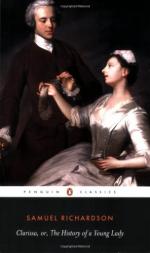Indeed very few of her intimates would propose cards, if they could engage her to read, to talk, to touch the keys, or to sing, when any new book, or new piece of music, came down. But when company was so numerous, that conversation could not take that agreeable turn which it oftenest does among four or five friends of like years and inclinations, and it became in a manner necessary to detach off some of it, to make the rest better company, she would not refuse to play, if, upon casting in, it fell to her lot. And then she showed that her disrelish to cards was the effect of choice only; and that she was an easy mistress of every genteel game played with them. But then she always declared against playing high. ‘Except for trifles,’ she used to say, ’she would not submit to chance what she was already sure of.’
At other times, ‘she should make her friends a very ill compliment,’ she said, ’if she supposed they would wish to be possessed of what of right belonged to her; and she should be very unworthy, if she desired to make herself a title to what was theirs.’
‘High gaming, in short,’ she used to say, ’was a sordid vice; an immorality; the child of avarice; and a direct breach of that commandment, which forbids us to covet what is our neighbour’s.’
She was exceedingly charitable; the only one of her family that knew the meaning of the word; and this with regard both to the souls and the bodies of those who were the well-chosen objects of her benevolence. She kept a list of these, whom she used to call her Poor, entering one upon it as another was provided for, by death, or any other way; but always made a reserve, nevertheless, for unforeseen cases, and for accidental distresses. And it must be owned, that in the prudent distribution of them, she had neither example nor equal.
The aged, the blind, the lame, the widow, the orphan, the unsuccessful industrious, were particularly the objects of it; and the contributing to the schooling of some, to the putting out to trades and husbandry the children of others of the labouring or needy poor, and setting them forward at the expiration of their servitude, were her great delights; as was the giving good books to others; and, when she had opportunity, the instructing the poorer sort of her honest neighbours, and father’s tenants, in the use of them. ‘That charity,’ she used to say, ’which provides for the morals, as well as for the bodily wants of the poor, gives a double benefit to the public, as it adds to the number of the hopeful what it takes from that of the profligate. And can there be, in the eyes of that God, she was wont to say, who requires nothing so much from us as acts of beneficence to one another, a charity more worthy?’
Her uncle Antony, when he came to settle in England with his vast fortune obtained in the Indies, used to say, ’This girl by her charities will bring down a blessing upon us all.’ And it must be owned they trusted pretty much to this presumption.




